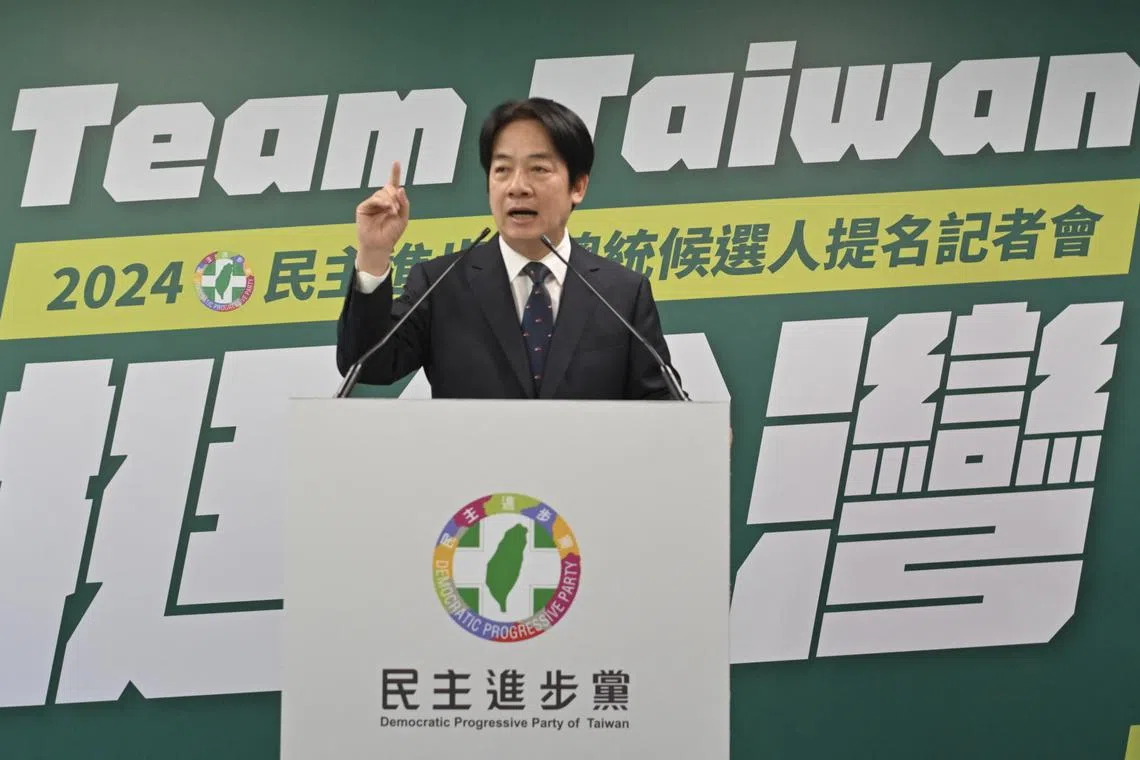Taiwan’s ruling party DPP names William Lai as its presidential candidate
Sign up now: Get insights on Asia's fast-moving developments

Taiwanese Vice-President and Democratic Progressive Party chairman William Lai speaking at the party's headquarters in Taipei on April 12.
PHOTO: AFP
TAIPEI – Taiwan Vice-President William Lai has been named the ruling Democratic Progressive Party’s (DPP) candidate for the January 2024 presidential election, which is set to be a tense race closely watched by Beijing and Washington amid soaring cross-strait tensions.
“I’m very honoured to be nominated... to shoulder the mission of protecting Taiwan,” Mr Lai, 63, said while accepting the nomination during a press conference at the DPP headquarters on Wednesday.
He pledged to continue President Tsai Ing-wen’s foreign policy, calling it the way for Taiwan’s future.
“Under President Tsai’s leadership, the world has seen and recognised Taiwan,” he said, promising to continue in the same vein so that the international community will embrace the island.
He compared Ms Tsai’s trip to the United States
“Former president Ma was going backwards in the direction of the ‘One China’ principle, but President Tsai was walking on the path of democracy, and facing the future,” he said.
Mr Lai’s candidacy was widely expected, especially after he assumed the DPP’s chairmanship in January when Ms Tsai stepped down from the position following the party’s thrashing at the local elections in November 2022.
With Taiwan becoming the biggest flashpoint in the increasingly fraught United States-China relationship, all eyes are now on who will be the next leader and how the person will guide the island’s foreign policy. Ms Tsai, first elected as president in 2016 and then in 2020, cannot contest again, owing to term limits.
Mr Lai had generated concerns among political watchers over some of his statements in the past, particularly when he described himself as a “political worker for independence” in 2017 while serving as Taiwan’s premier.
Beijing, which claims sovereignty over the island and has not ruled out force to reunify with it, views de jure Taiwan independence as a red line.
But Mr Lai has moderated his stance and made assurances that he intends to follow in the footsteps of Ms Tsai, who is known for her quiet pragmatism, analysts said.
“He has clarified that he does not believe there is a need to declare independence because he considers Taiwan already independent and sovereign,” Assistant Professor James Lee from Taipei’s Academia Sinica told The Straits Times.
“In the lexicon of Taiwanese politics, this is a relatively moderate position in favour of the status quo,” he said.
Based on the latest data from a long-running poll by Taiwan’s National Chengchi University, more than 88 per cent of respondents prefer to have the status quo maintained in some form in the Taiwan Strait.
Mr Lai, who was born in 1959 into a coal miner’s family in a rural village outside Taipei, had grown up with the aim of becoming a doctor and earned a master’s degree in public health from Harvard University. But he switched from a life in medicine to politics after the Third Taiwan Strait Crisis – when China fired missiles into the sea around the island in 1995 and 1996 – pushing him to want to do something for Taiwan, he once said.
Before his current role as Vice-President, Mr Lai had served as a legislator, the mayor of Tainan, as well as premier.
Meanwhile, former Taipei mayor Ko Wen-je is expected to announce his run as the presidential candidate for the upstart Taiwan People’s Party. He is currently travelling through the US, promoting his party as an alternative to the DPP and KMT, the two main political parties.
Going forward, it is not surprising that Mr Lai would follow in the footsteps of Ms Tsai, should he become president, said Dr Chen Fang-yu, a political scientist at Taiwan’s Soochow University. That includes the continued strengthening of ties with powerful partners such as the US and Japan.
“Ms Tsai has been very successful in helping Taiwan to build strong ties with like-minded partners which share the same values of freedom and democracy. She has laid out a very good path for Mr Lai, and there is no reason for him to move away from this path,” he said.
But the main opposition KMT, which has traditionally favoured warmer ties with Beijing, decried the DPP’s moves as making Taiwan less secure. China has ramped up its military, diplomatic and economic pressure on the island in recent years, including staging large-scale military drills around Taiwan last week following Ms Tsai’s historic meeting with US House Speaker Kevin McCarthy
“As election campaigning begins, we can expect to see Ms Tsai’s opponents play up the peace versus war narrative, and say that the DPP is pushing Taiwan to war,” said Dr Chen.
Indeed, after Mr Lai’s nomination, KMT chairman Eric Chu told reporters that it is a “critical moment” for deciding if both sides of the strait will conduct peaceful exchanges and dialogue in the future, or head for confrontation and war.
Mr Lai is well aware of this. On Wednesday, he stressed that the election is not about a choice between peace and war. “It’s about choosing between democracy and autocracy,” he said, adding that until Beijing rules out the use of force against Taiwan, the island must strengthen its defence capabilities.
It is still unclear who the KMT will name as its presidential candidate, though front runners are believed to be Mr Chu and New Taipei City Mayor Hou Yu-ih. The billionaire founder of major Apple supplier Foxconn, Mr Terry Gou, has said that he is seeking the party’s nomination



